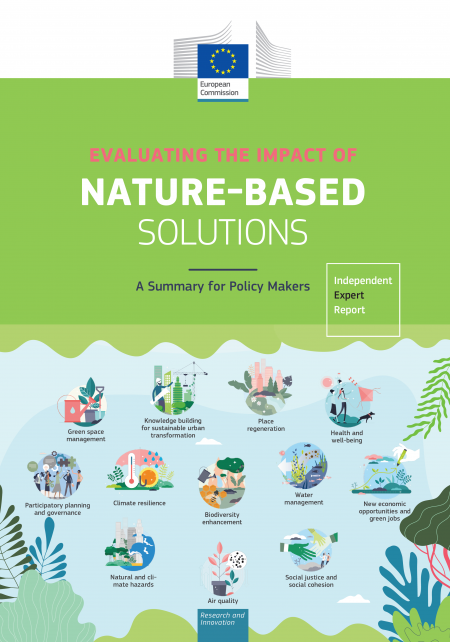New European Commission report on evaluating the impact of Nature-based Solutions

A new report from the European Commission Directorate-General for Research and Innovation, Evaluating the Impact of Nature-Based Solutions: A Summary for Policy Makers, provides a high-level summary for practitioners and policy-makers for assessing the impact of nature-based solutions (NbS).
Assessing the impacts of NbS is essential to understand their effectiveness in addressing current interrelated societal challenges. Robust impact evaluation supports practitioners to understand and document the outcomes of nature-based solutions, resulting in improved quality, efficiency and effectiveness at various stages of NbS implementation. Knowing which nature-based interventions are effective and at what cost is critical for decisions about the action itself, as well as for assessment of the up-scaling and/or replication potential of a given nature-based solution.
The report highlights the relevance of nature-based solutions, the societal problems these solutions aim to address, and the importance of robust indicators in evaluating solutions. An outline of the tools necessary to put the information into practice is also included, as well as four NbS case studies from across Europe exploring the diverse local contexts that impact evaluation.
The report provides a reference for EU-level policies and activities on evaluating effects of NbS, and is a concise summary of the previously-released Handbook for Practitioners containing the comprehensive NbS impact assessment framework. The full handbook is a result of the collaboration of 17 EU-funded Horizon 2020 NbS projects and collaborating institutions, with their findings brought together into a guide to the development and implementation of scientifically-valid monitoring and evaluation plans. The document contains criteria outlined across 12 societal challenge areas: Climate Resilience; Water Management; Natural and Climate Hazards; Green Space Management; Biodiversity; Air Quality; Place Regeneration; Knowledge and Social Capacity Building for Sustainable Urban Transformation; Participatory Planning and Governance; Social Justice and Social Cohesion; Health and Well-being; New Economic Opportunities and Green Jobs.
Learn more by downloading the full Summary for Policymakers Report or the full Handbook for Practitioners from the Publications Office of the European Union.




